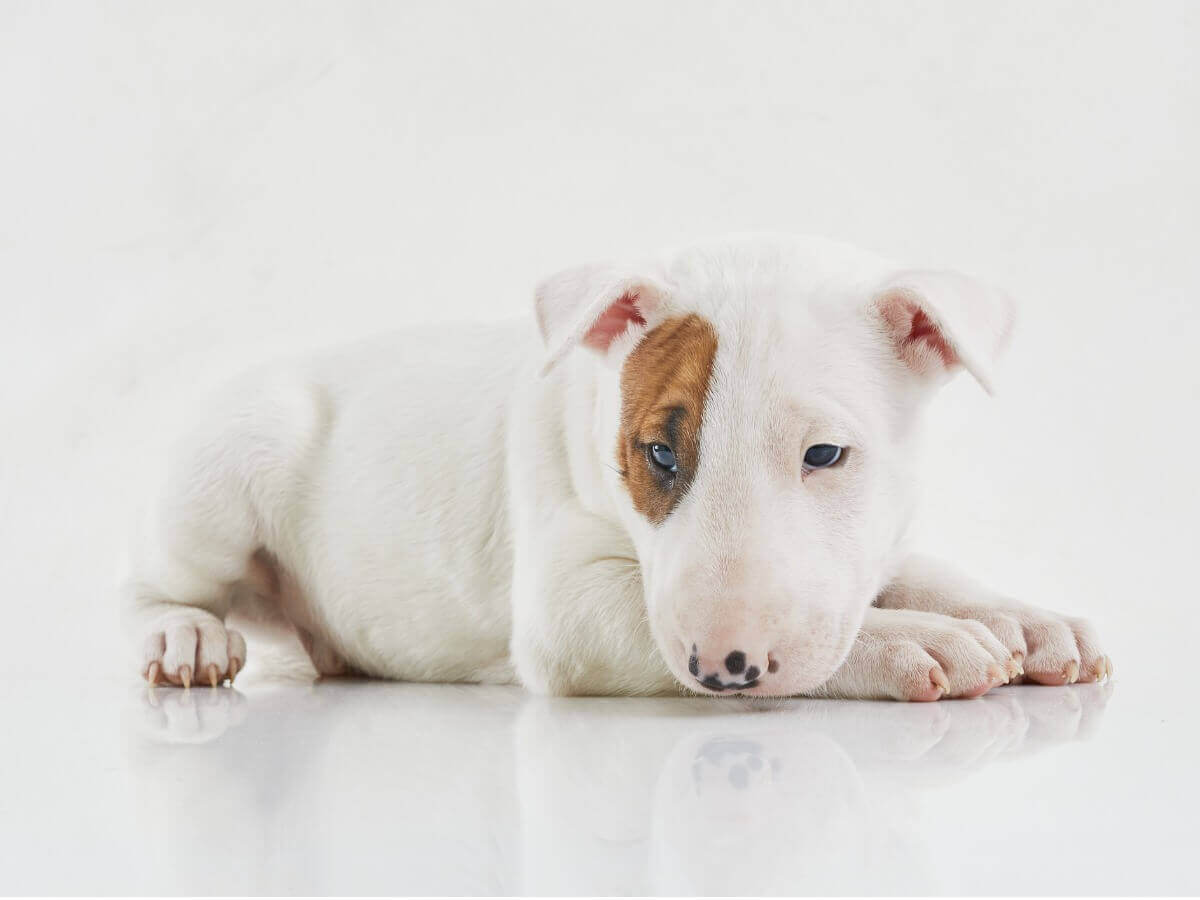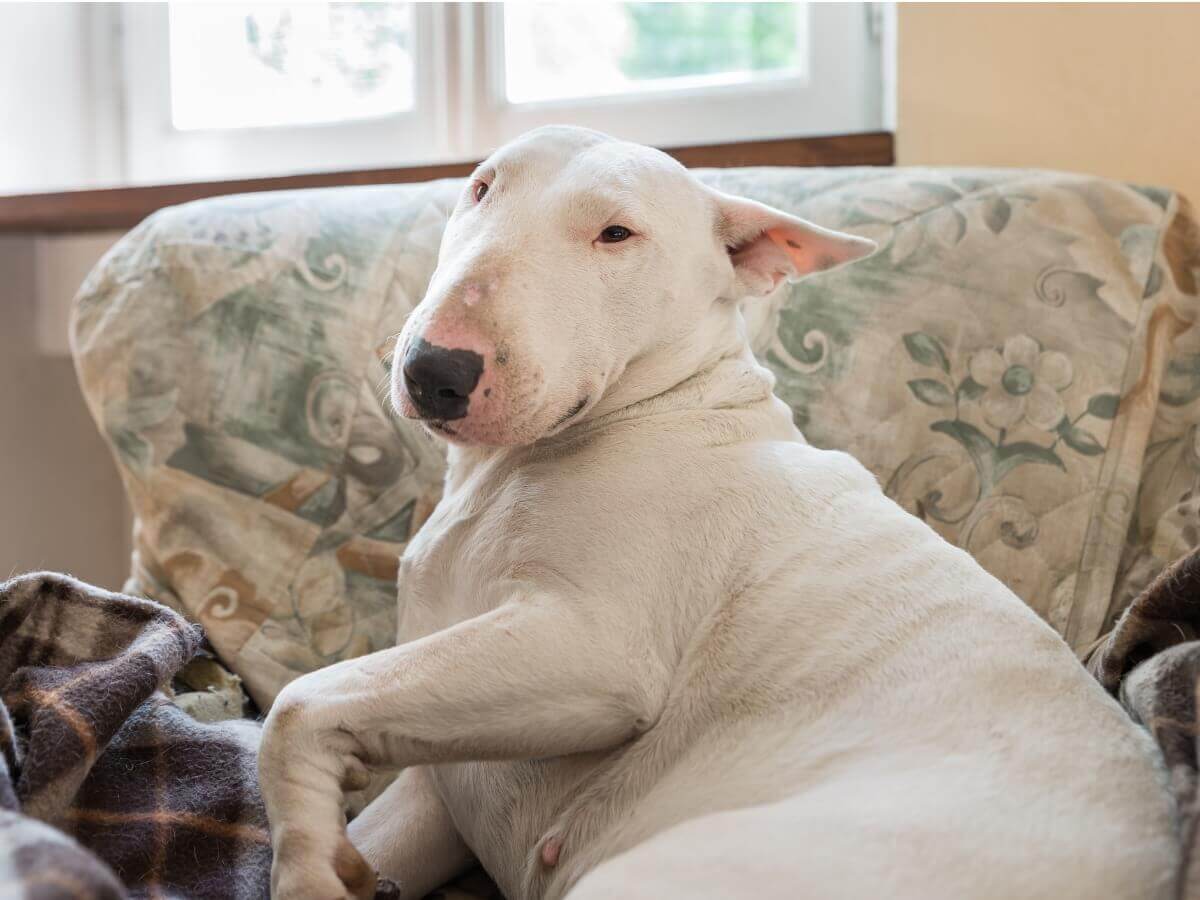Caring for the English Bull Terrier


Reviewed and approved by the biologist Samuel Sanchez
As pet owners, you always want to give the animal in your home the best. However, sometimes owners extrapolate care from one species to another without taking into account that each has its specific needs. Not even within the world of dogs does each and every breed have the same requirements. Therefore, in this case, we want to specifically discuss how to care for the English bull terrier.
This dog, with imposing physical characteristics, hides a loving, funny, and protective character with his family. It’s a dog of great strength that needs good socialization and that enjoys and requires human company. Let’s take a closer look at the main care that this breed requires.
Breed characteristics
Before explaining the most important aspects of care that an English Bull Terrier needs to be able to enjoy good physical and mental health, we’ll expose the most important characteristics of this dog.
Originating in Great Britain, this breed was conceived as a light but strong fighting and show dog, in order to resist during fights between dogs. To achieve this, bulldogs were crossed with terriers. From the former, they inherited combativeness and resistance to pain. From the latter, they obtained their particular agility and sagacious character.
As a result of this selection, today this breed is made up of muscular and strong dogs, with very short and smooth hair, predominantly white in color, although there may also be brindle, black, or red specimens. Undoubtedly, the most characteristic of this dog’s physique is its oval head, with its eyes and ears shaped like a triangle.
Its size at the withers ranges between 21 and 22 inches and its weight between 50 and 68 pounds. There’s a variant of the breed that is the miniature bull terrier, whose size is between 12 and 14 inches. Having said that, it’s important to note that the English bull terrier is a dog that, with the necessary care, reaches an average life of 12 to 13 years. Let’s see what that care looks like.

The most important aspects of caring for the English bull terrier
Among the aspects to take into account if you have an English Bull Terrier as a pet are those related to its diet, its daily activity, and its hygiene.
Feeding
The main issue to consider regarding the feeding of this dog is that its diet must consist of quality ingredients and adjust to each stage of its life. For example, puppies usually eat 3 times a day. However, when the animal switches over to an adult dog food, the doses will drop to 2 daily intakes.
It’s very wise to choose a food formulated specifically for the breed. However, if you don’t have one on hand, you’ll need to choose food for very energetic medium-sized dogs when it’s an adult bull terrier. In the senior stage, you should modify their diet again to one of older dogs, which takes into account the animal’s decrease in activity.
The food manufacturer or your veterinary will indicate the exact amounts in each case. If you’re opting for a natural diet that you prepare at home, such as the BARF diet, it must also have the approval of a veterinary professional.
Another important consideration having to do with their diet according to the professionals of the American Kennel Club is that these dogs can be prone to being overweight. For this reason, once again, it’s important to control the calories in their food and the consumption of snacks. Finally, you should introduce natural calcium into their diet, especially when they are puppies.
Physical and mental exercise for the English bull terrier
Another aspect of English bull terrier care that you must take into account is the need for daily exercise that this dog has. This is so because it’s a very energetic and nervous animal, which needs to exercise a lot, both for its physical and mental health.
Regarding their physical needs, long walks and runs will help them keep their muscles, joints, and blood circulation in shape, as in any other dog. However, in this case, and due to the aforementioned tendency to gain extra pounds, moderate or intense physical activity is necessary in order for the dog to burn calories.
On a mental level, outings and games will keep their mind busy. Additionally, a basic need of the English Bull Terrier that experts indicate is to bite. For this reason, special ropes, dolls, and bones must be available to them so that they can gnaw on them, especially when they’re puppies. If not, the dogs will chew on their owner’s things.
All of the above will help the dog to release stress, thus avoiding destructive behavior problems at home, which come from anxiety and boredom. Therefore, their happiness and mental stability depend on daily activity.
English bull terrier hygiene
When it comes to hygiene, caring for the English Bull Terrier isn’t complicated. As it’s a short-haired dog – it sheds it twice a year – you only need to brush it twice a week to remove dead hair and superficial dirt. For this, you can use a special rubber glove for the task or a brush.
Baths should take place once a month at most, always with a specific shampoo for dogs. After bathing, you should dry the animal with a towel. You don’t need to use a hairdryer on them because their short hair will dry easily. Of course, you have to be careful that the dog doesn’t go outside wet if the temperature is low.
Other important issues related to their hygiene are those typical of any dog: The examination and cleaning of the ears to remove wax and other dirt that’s gotten in, tooth brushing, and nail trimming if necessary.
Further care of the English bull terrier
In addition to the care we’ve already mentioned, below are other requirements having to do with the behavior and character of this canine.
Socialization
As with all dogs, one of the important needs of the English Bull Terrier is to receive correct socialization. This should start with their mother and other puppies and can continue with their owner after 8 weeks of age. For good socialization, the dog must interact with different people, animals, environments, objects, noises, etc.
Otherwise, their adult behavior may not be correct. For example, they may be fearful of strangers or even aggressive towards other animals. At the same time, while socialization is taking place, owners must spend a lot of time on their training.
This breed can get along well with other animals and live with them without complications. However, this is only true if it’s been raised with them since it was a puppy and if the dog has socialized correctly. If not, the bull terrier can be somewhat suspicious and even aggressive towards other living beings.
Training
This is a dog that, due to its high degree of energy, can be somewhat difficult to train. However, working hard on this task is extremely important because it tends to be destructive when left alone. This is due to separation anxiety that this breed has a tendency to suffer. If on top of that, it hasn’t received proper training, it may cause problems in the home.
In addition to this, their education is necessary because, like all dogs, they need to learn to obey basic obedience commands, control their chewing, go to the bathroom outdoors, among many other things. For this, positive training should always be used and, if the owner isn’t able to carry it out, they must have the help of a canine behavior professional.
In this regard, you should remember that, when a pet is to be adopted, it’s essential to know its characteristics and if it can adapt to the lifestyle of the adopter. If not, the responsible thing would be to reconsider the decision. In the case of English Bull Terriers, an incorrect education can be a really bad thing.
The health of an English bull terrier
This breed is prone to certain diseases that it has inherited over time through genetic transfer. Periodic veterinary check-ups will help detect any existing health problem and provide the possibility of treating it. Among the most frequent diseases that this dog can suffer from are:
- Kidney problems
- Skin problems, such as dermatitis
- Deafness
- Obesity
- Patella luxation
- Heart problems
- Allergies

Finally, in addition to visits to the veterinary center for periodic consultations, the vaccination and deworming schedule of this dog must be taken into account, as it’s usually quite sensitive to parasites and insect bites. If you follow all these steps, your bull terrier will be a wonderful companion for a long time.
All cited sources were thoroughly reviewed by our team to ensure their quality, reliability, currency, and validity. The bibliography of this article was considered reliable and of academic or scientific accuracy.
- Bull terrier. American Kennel Club. Recogido el 13 de julio en https://www.akc.org/dog-breeds/bull-terrier/
- Bull Terrier. Federación Cinológica Internacional. Recogido el 13 de julio en http://www.fci.be/nomenclature/Standards/011g03-es.pdf
- Manual del Bull Terrier. Recogido el 13 de julio en https://kupdf.net/download/manual-del-bull-terrier_5977e22bdc0d60412d043371_pdf
- Salanueva, S. (2019). Cómo Adiestrar a Un Perro de Raza Bull Terrier: Adiestramiento Fácil de un Bull Terrier (Spanish Edition). Independently published.
- Stonewood, M. (2019). The Bull Terrier: A Complete and Comprehensive Owners Guide to: Buying, Owning, Health, Grooming, Training, Obedience, Understanding and Caring for Your Bull Terrier (English Edition) [Libro electrónico].
This text is provided for informational purposes only and does not replace consultation with a professional. If in doubt, consult your specialist.